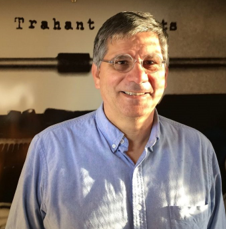Another round of primary elections occur this week and a lot of attention focuses on Kansas because that’s where supporters of Bernie Sanders see a new kind of Democratic Party developing. And, on the other side, Republicans have sent the President and Vice President to campaign in the state to save Rep. Kevin Yoder’s seat and, get this, rally against candidates who are “too extreme.”
But that’s the hype. There is another story to tell. On a conference Friday, Sharice Davids, Ho Chunk, talked about local issues. Growing up in the Kansas third congressional district. And the importance of electing a Native woman to Congress for the first time ever.
“I got into this race because what I saw was a lot of dissatisfaction with the way Keven Yoder has been failing to represent our district,” she said. The congressional district has many diverse and interesting experiences “that we don’t see enough of in Congress.”
As in a voice like Davids. She has worked for law firms in Kansas City, as well as economic enterprises at Pine Ridge, and was a White House Fellow in the Obama administration.
When she is out talking to people she said she hears from people who want to see representation that captures that diversity that is Kansas. Yes, diversity in Kansas. (The district is more than 80 percent white, but it’s also nearly 10 percent African American, 3 percent Asian, 7 percent Hispanic, and about 1 percent Native American.) Davids would be the first (or better one of the first) Native American women in Congress ever. She would also be first openly gay representative from Kansas.
And there is a sense that 2018 is the year for Democratic women to run and win seats in Congress. That’s why Emily’s list has invested so much in this primary, some $400,000 to support Davids.
In politics timing is everything: And polling is showing there has never been a gender gap as wide as the one present this year.
Pew Research says “women have been more likely than men to identify as Democrats or lean Democratic. But today, a 56 percent majority of women identify as Democrats or lean Democratic, while 37 percent affiliate with or lean toward the GOP. The share of women identifying as Democrats or leaning Democratic is up 4 percentage points since 2015 and is at one of its highest points since 1992. ”
And the twist in this data is that Republicans are likely to end up with fewer women as elected officials. As The New York Times reported last May, of the 23 Republican women in the House, six — about one-quarter — are retiring or seeking higher office. Just last week one of those seeking higher office, Rep. Diane Black lost her bid in the Tennessee primary for governor.
And younger women, in particular, are trending toward Democrats and other women. Pew says nearly six-in-ten Millennials affiliate with the Democratic Party or lean Democratic.
It’s those numbers that work to Davids’ advantage.
There has been a lot of drama — and intense conversations on the Internet — about Bernie Sanders endorsing Brent Welder. Welder, it’s said, is more progressive, more in line with Sanders’ Democratic Socialism. But none of the candidates has Davids’ experience working with people who have never been represented in the Congress.
But Davids avoids that big picture conversation. When asked, she turns the conversation back to the district, and the business at hand, Tuesday’s primary.
The campaign says than 3,500 individuals have contributed funds and of that, more than a thousand donations came from the state of Kansas. “Volunteers have also flocked to the campaign in these final weeks, allowing Davids’ field program to grow exponentially. Hundreds of volunteers have made tens of thousands of voter contacts via phone and face-to-face meetings in the past four weeks,” said a campaign news release. “My name is on this campaign but this is about so much more than me,” Davids said. “The energy and excitement people are contributing is what will bring us a victory on Aug. 7.”
Davids’ local focus has been noted. The Kansas City Star endorsed Davids last week. “The Star’s endorsement is based in part on Davids’ policy positions. They fit comfortably within the party’s traditional platform — expanded access to health care, common-sense gun legislation, support for schools and families and opposition to tax giveaways for the wealthy.”
And, the Star said, “she’s also far too smart to think she has all the answers. She will be willing to listen to different views and seek compromise where possible, an essential quality for those who aspire to service in our national legislature.”
“My lived experience has helped me learn how to listen better,” Davids told the Star’s editorial board.
Local. And Indigenous.
Kansas Primary (Aug. 7)
In addition to Davids’ race, Secretary of State Kris Kobach and a handful of other Republicans are taking on GOP Gov. Jeff Colyer. Rep. Ponka-We Victors is running unopposed in the Kansas House of Representatives District 103 Democratic primary.
What’s ahead in Indian Country Today
Sunday: Washington state profile
Monday: Hawaii profile
Tuesday night / Wednesday morning election results
Mark Trahant is editor of Indian Country Today. He is a member of the Shoshone-Bannock Tribes. Follow him on Twitter – @TrahantReports
Email: mtrahant@IndianCountryToday.com









